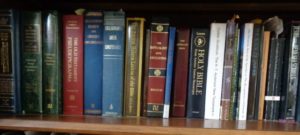 In my studies of the sun, I have found that although most English translations refer to the sun setting or going down, the Hebrew tells a different story.
In my studies of the sun, I have found that although most English translations refer to the sun setting or going down, the Hebrew tells a different story.
(Genesis 15:12 ESV) As the sun was going down, a deep sleep fell on Abram. And behold, dreadful and great darkness fell upon him.
(Genesis 15:17 ESV) When the sun had gone down and it was dark, behold, a smoking fire pot and a flaming torch passed between these pieces.
(Genesis 28:11 ESV) And he came to a certain place and stayed there that night, because the sun had set. Taking one of the stones of the place, he put it under his head and lay down in that place to sleep.
The Hebrew word translated in these passages as “going down”, “gone down” and “set” is “bo” (H935). According to Brown Driver Briggs it is a primitive root that means, “to go in, enter, come, go, come in”. Notice this definition makes no mention of a downward direction.
“Bo” is used over 2,500 times in the Tanakh/OT, and in only about 23 verses particularly in conjunction with the sun (H8121 “shemesh”). In all the verses where it is used directly with “shemesh” it is typically translated in the ESV as one of the three ways shown above.
(See Exodus 17:12; 22:26; Leviticus 22:7; Deuteronomy 16:6; 23:11; 24:13,15; Joshua 8:29; 10:27; Judges 14:18; 19:14; 2 Samuel 2:24; 3:35; 1 Kings 22:36; 2 Chronicles 18:34; Isaiah 60:20; Jeremiah 15:9; Amos 8:9; Micah 3:6)
However, when looking at the use of the word in all of the other verses (over 2,200 of them), I don’t see it ever translated as that. Here is just a sampling of the many uses of the word elsewhere:
(Genesis 2:19 ESV) Now out of the ground the LORD God had formed every beast of the field and every bird of the heavens and brought them to the man to see what he would call them. And whatever the man called every living creature, that was its name.
(Genesis 45:25 ESV) So they went up out of Egypt and came to the land of Canaan to their father Jacob.
(Exodus 24:18 ESV) Moses entered the cloud and went up on the mountain. And Moses was on the mountain forty days and forty nights.
(Leviticus 14:8 ESV) And he who is to be cleansed shall wash his clothes and shave off all his hair and bathe himself in water, and he shall be clean. And after that he may come into the camp, but live outside his tent seven days.
(Numbers 19:14 ESV) “This is the law when someone dies in a tent: everyone who comes into the tent and everyone who is in the tent shall be unclean seven days.
(Judges 3:20 ESV) And Ehud came to him as he was sitting alone in his cool roof chamber. And Ehud said, “I have a message from God for you.” And he arose from his seat.
(1 Samuel 10:13 ESV) When he had finished prophesying, he came to the high place.
(Job 2:1-2 ESV) Again there was a day when the sons of God came to present themselves before the LORD, and Satan also came among them to present himself before the LORD. And the LORD said to Satan, “From where have you come?” Satan answered the LORD and said, “From going to and fro on the earth, and from walking up and down on it.”
(Psalms 45:15 ESV) With joy and gladness they are led along as they enter the palace of the king.
(Jeremiah 17:19 ESV) Thus said the LORD to me: “Go and stand in the People’s Gate, by which the kings of Judah enter and by which they go out, and in all the gates of Jerusalem,
(Ezekiel 7:6 ESV) An end has come; the end has come; it has awakened against you. Behold, it comes.
(Joel 2:9 ESV) They leap upon the city, they run upon the walls, they climb up into the houses, they enter through the windows like a thief.
(Haggai 1:2 ESV) “Thus says the LORD of hosts: These people say the time has not yet come to rebuild the house of the LORD.”
It seems to me that the notion of the sun going down or setting is based on the translator’s perspective of what the sun does rather than on the literal Hebrew to English translation.
The Setting of the Sun or Its Entrance?
Another example is the use of the Hebrew noun “mabo” (H3996), which comes from the root word “bo”, used directly in conjunction with “shemesh”.
It is translated as “the going down of”, “its setting” or when combined with the sun, as the direction “west”, as seen in the following verses:
(Deuteronomy 11:30 ESV) Are they not beyond the Jordan, west of the road, toward the going down of the sun, in the land of the Canaanites who live in the Arabah, opposite Gilgal, beside the oak of Moreh?
(Joshua 1:4 ESV) From the wilderness and this Lebanon as far as the great river, the river Euphrates, all the land of the Hittites to the Great Sea toward the going down of the sun shall be your territory.
(Joshua 23:4 ESV) Behold, I have allotted to you as an inheritance for your tribes those nations that remain, along with all the nations that I have already cut off, from the Jordan to the Great Sea in the west.
(Psalms 104:19 ESV) He made the moon to mark the seasons; the sun knows its time for setting.
(Psalms 50:1 ESV) A Psalm of Asaph. The Mighty One, God the LORD, speaks and summons the earth from the rising of the sun to its setting.
(Psalms 113:3 ESV) From the rising of the sun to its setting, the name of the LORD is to be praised!
(Zechariah 8:7 ESV) Thus says the LORD of hosts: Behold, I will save my people from the east country and from the west country,
(Malachi 1:11 ESV) For from the rising of the sun to its setting my name will be great among the nations, and in every place incense will be offered to my name, and a pure offering. For my name will be great among the nations, says the LORD of hosts.
According to Brown-Driver-Briggs, the secondary definition of “mabo” (H3996) is “sunset”, but the primary definition is “entrance, a coming in, entering”. Here are all the other verses where this word is used:
(Judges 1:24-25 ESV) And the spies saw a man coming out of the city, and they said to him, “Please show us the way into the city, and we will deal kindly with you.” And he showed them the way into the city. And they struck the city with the edge of the sword, but they let the man and all his family go.
(2 Kings 11:16 ESV) So they laid hands on her; and she went through the horses’ entrance to the king’s house, and there she was put to death.
(2 Kings 16:18 ESV) And the covered way for the Sabbath that had been built inside the house and the outer entrance for the king he caused to go around the house of the LORD, because of the king of Assyria.
(1 Chronicles 4:39 ESV) They journeyed to the entrance of Gedor, to the east side of the valley, to seek pasture for their flocks,
(1 Chronicles 9:19 ESV) Shallum the son of Kore, son of Ebiasaph, son of Korah, and his kinsmen of his fathers’ house, the Korahites, were in charge of the work of the service, keepers of the thresholds of the tent, as their fathers had been in charge of the camp of the LORD, keepers of the entrance.
(2 Chronicles 23:13 ESV) And when she looked, there was the king standing by his pillar at the entrance, and the captains and the trumpeters beside the king, and all the people of the land rejoicing and blowing trumpets, and the singers with their musical instruments leading in the celebration. And Athaliah tore her clothes and cried, “Treason! Treason!”
(2 Chronicles 23:15 ESV) So they laid hands on her, and she went into the entrance of the horse gate of the king’s house, and they put her to death there.
(Proverbs 8:3 ESV) beside the gates in front of the town, at the entrance of the portals she cries aloud:
(Jeremiah 38:14 ESV) King Zedekiah sent for Jeremiah the prophet and received him at the third entrance of the temple of the LORD. The king said to Jeremiah, “I will ask you a question; hide nothing from me.”
(Ezekiel 26:10 ESV) His horses will be so many that their dust will cover you. Your walls will shake at the noise of the horsemen and wagons and chariots, when he enters your gates as men enter a city that has been breached.
(Ezekiel 33:31 ESV) And they come to you as people come, and they sit before you as my people, and they hear what you say but they will not do it; for with lustful talk in their mouths they act; their heart is set on their gain.
(Ezekiel 42:9 ESV) Below these chambers was an entrance on the east side, as one enters them from the outer court.
(Ezekiel 44:5 ESV) And the LORD said to me, “Son of man, mark well, see with your eyes, and hear with your ears all that I shall tell you concerning all the statutes of the temple of the LORD and all its laws. And mark well the entrance to the temple and all the exits from the sanctuary.
(Ezekiel 46:19 ESV) Then he brought me through the entrance, which was at the side of the gate, to the north row of the holy chambers for the priests, and behold, a place was there at the extreme western end of them.
This affirms in my mind that the idea of the sun going down or setting according to the Old Testament / Tanakh is purely based on English translations and not the Hebrew text. Therefore, I am not committed to a notion that the sun must go in the direction of down when it disappears from view over the horizon.


Pingback: Does the Sun Really Rise? | Messyanic Misfits
“The Hebrew word translated in these passages as “going down”, “gone down” and “set” is “bo” (H935). According to Brown Driver Briggs it is a primitive root that means, “to go in, enter, come, go, come in”. Notice this definition makes no mention of a downward direction.”
All of a sudden Brown Driver Briggs definition makes so much sense in relation to the sun’s movement! This is very helpful! Praise Yah!
Yeah, I did this study a few years ago and found the notion of the sun “going down” vs. “rising” to be more telling. That is why I made this post first. I hemmed and hawed about sharing what I found regarding the sun “rising” because it didn’t seem that noteworthy. But I think presenting both aspects fills in the picture of what the sun does on a daily basis: “comes out” and “goes in”. Couple that with what Enoch says concerning the 12 “gates/portals” through which the sun travels, it’s like a big “aha!”…at least it was for me. 😉